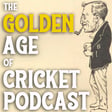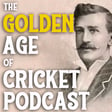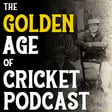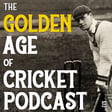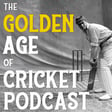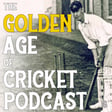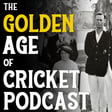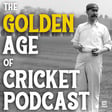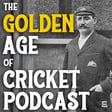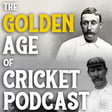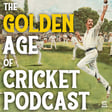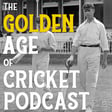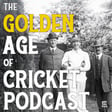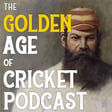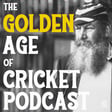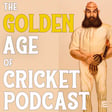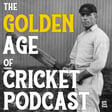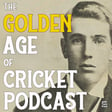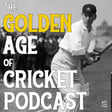Introduction and Donations Request
00:00:09
Speaker
Hello and welcome to part two of this Golden Age of Cricket episode on the early years of the life and career of Australia's Charlie McCartney. If you'd like to support the broadcast, you're welcome to make a small donation. Please visit buymeacoffee.com slash golden age of cricket.
Charlie McCartney in the 1907-08 Ashes
00:00:34
Speaker
We now return to the discussion with biographer Peter Lloyd during Charlie's maiden test series, the Ashes of 1907-08.
00:00:46
Speaker
As tradition dictated, the third test moved to the ah very picturesque Adelaide Oval um for the 1907-08 series and history remembers this match for the match-saving partnership between k Clem Hill and Roger Hartigan.
00:01:04
Speaker
But we can easily forget ah that McCartney, young Charlie McCartney top scored for Australia in the first innings with his 75 coming in at first drop. So again, he moves around in the batting order, this time batting at number three. Was this the innings, Peter, which perhaps cemented McCartney in the Australian side?
00:01:29
Speaker
I think McCartney's place in the test 11 was really assured by his form in the first two tests of the series. With only two days separating the second and third tests, two changes were made to the Australian side with a dropping of the unfortunate cherry haslet and the inclusion of Queenslander Roger Hardigan and the forced replacement of the injured tippy Connor by debutante Jack O'Connor.
McCartney's Performance in the 1907-08 Series
00:01:53
Speaker
Charlie must have been kicking himself when he was dismissed to LBW to Wilford Roads for 75 and 153 minutes with nine fours. He he did bat at first drop, replacing Clem Hill who'd had a severe dose of the flu um and showed a degree of coolness rarely exhibited by a test newcomer. His bowling was also impressive when he collected two wickets for 49 runs off 18 overs. The ever so miserly Warwick Armstrong bowl the same number of overs and conceded 55 runs.
00:02:22
Speaker
So Charlie ah further cemented his position in the Australian level. I guess you could put it that way. I think he was well established now as a core member of the team and he continued to impress.
00:02:37
Speaker
Yeah, indeed. And just to elaborate on my question, your answer, because the two facts might seem a bit contradictory, but yes, Clem Hill came down with a nasty bout of the flu, moved down the order, but then put on what is regarded as one of the great all-time test performances. I think he hit 160, battling the heat. It was about 40 degrees. He had the flu and put on a huge partnership ah with Hartigan.
00:03:06
Speaker
But that in itself core is the reason why Charlie McCartney moved to number three in the batting order, which was traditionally Clem Hill's position. So with McCartney all but confirmed in terms of his position in the Australian side, um and ah it seems like he would be in a good position to make the next Ashes tour, which is the tour of 1909.
Player Disputes and McCartney's Career Resilience
00:03:33
Speaker
This might be a good time to bring up the ongoing player dispute happening in the country with the Australian Board of Control, ah which of course continues to rumble for the next few years. What relevance did this have at all in terms of Charlie's early career, Peter?
00:03:56
Speaker
Oh, I'd have to say that it didn't really have any impact whatsoever on on Charlie at that stage. um Along with all the other youngsters in the Australian 11 or those on the periphery, they were totally committed to ensuring their places in the site or being selected as a member of the next Ashes touring party. Charlie would return from the 909 tour with a deeper understanding, I think, of the tensions between the leading lights and the board, in particular fellow tourists and board man, Peter McAllister. As I mentioned earlier, he would also suffer at the selection table in the 1911 and 12 season. But at this at this point, his whole focus was on playing well and remaining in form and in the team.
00:04:44
Speaker
Yeah, okay, so um nothing yet is happening.
Challenges in the 1912 Triangular Series
00:04:47
Speaker
So he makes the, he is selected for the 1909 Ashes Tour to England, but it appears certainly from my point of view and perhaps and any observer of cricket statistics and selections that it's a bit ah bit of an anticlimax um because despite the previous Australian summer where he seems to be establishing himself,
00:05:12
Speaker
Monty Noble then doesn't select him for the opening first-class match of the tour, which is against Nottinghamshire at Trent Bridge. And then when he is selected to play against Northamptonshire, he bats at number 11 and he does take four wickets, mind you. So what's going on here, Peter? is this Is this Monty Noble just experimenting before the test matches begin or is there something greater at play?
00:05:41
Speaker
Nobles, cautious if we could call it that use of Charlie's talents at the beginning of the 909 tour, were linked to the Little Gordonians state of physical health. um In late October, 1908, Charlie was hospitalised and underwent an inguinal hernia repair, a fact which was poorly reported at the time and which I only became aware of when examining his 1916 medical enlistment reports.
00:06:07
Speaker
for the war. ah The lengthy period of recuperation restricted his involvement in Sydney grade cricket for much of the season, especially limiting his appearances at the bowling crease. He played just four matches for New South Wales in that season leading into the tour and was nursed along by state skipper Noble. He battled down the order on most occasions, a luxury that the mother state could afford given the depth of talent in the squad with Warren Bardsley, Noble, Sid Gregory, Burt Hopkins, the Whatley brothers, Austin Diamond etc e etc all performing and admirably. ah In the vernacular Charlie was underdone at the commencement of the Ashes tour with Noble, man managing one of his strike weapons very astutely.
00:06:53
Speaker
Right. Okay. So I knew you would have the answer, of having having written biographies on both of these cricketers. um So despite this rather slow start to the 1909 Ashes Tour for Charlie, he then goes on to play in all five test matches.
00:07:11
Speaker
and it's an Asher series, which is successful for the visiting Australians. But in the first test, again, he is used as a bowler. He opens both innings for Australia as a bowler. And then in the third test at Headingley, he takes 11 wickets for the match. So how do you assess his maiden test series in England, both from ah a bowling and a batting perspective?
00:07:41
Speaker
ah So, he wasn't the most significant contributor to it to Australia's serious victory, but he was central to Nobles and Armstrong's. ah Noble and Armstrong worked very closely together as a leadership group. ah He was central to their strategy.
00:07:58
Speaker
A left-arm twirler with control and guile was indispensable. ah He just needed a conducive wicket. I think the sides were equally matched but Noble was by far the more capable captain and he knew perfectly well how to use Charlie's skills with the ball.
00:08:15
Speaker
As I mentioned earlier, Charlie was coming to grips with the conditions as the series
Monty Noble's Influence on McCartney
00:08:19
Speaker
unfolded. His attacking style of batting was evolving and he was on the cusp of dominance. Noble and Armstrong appreciated this, as did a few of the English experts.
00:08:30
Speaker
Yeah, and I think as you mentioned earlier, something which is perhaps lost slightly in ah this very cosmopolitan world we live in today is that Noble, his captain for the tour, being a fellow New South Welshman, probably understood Charlie and Charlie's medical history and just his development probably better than and most and was able to utilise him accordingly.
00:09:00
Speaker
That's true. I think Noble knew his ah team intimately. I knew the members of the team intimately knew their strengths and their foibles. And ah in Charlie's case, he was managed superbly by Noble. Yeah.
00:09:16
Speaker
So after returning to Australia from the 1909 Ashes tour, Charlie then makes a decision which at the time and perhaps even to this day appears a little strange. He
McCartney's Decision to Play in New Zealand
00:09:30
Speaker
goes to play cricket in Otago, New Zealand for four months and there doesn't seem to be any clear reason why he did this.
00:09:38
Speaker
and Charlie himself offers very little explanation. But what do you think were the motivations behind this move? Charlie's limited explanation was it was single a single sentence in his biography. But I think perhaps because of his father's ambitious plans for him, Charlie was disappointed with his cricketing performances on the 1909 tour.
00:10:04
Speaker
But beyond that, though, and given he had a letter of introduction, which was arranged by his father, um the the government sought to promote Charlie's character and um and being to authorities in in England, naming him as a person of of repute and somebody who could be relied upon. And that letter of introduction was an open letter which Charlie could use um as he saw fit. um However, despite that, there were no real emerging ah commercial um opportunities in England. And I think this but probably added to the angst that he perhaps felt about not um performing as as well as he may have wanted to.
00:10:56
Speaker
He was approached by the New Zealand business entrepreneur and cricket notable, ah Charles Robert Smith on the boat over to England. And I think a seed was planted at that time. He was very keen, Charlie was very keen to make his own mark and demonstrated and demonstrate to his father that he had what it take what it took to to go it alone and beyond cricket. But when nothing of note happened, he sailed back to Australia in a state of depression. um Even then it took him several days before he was able to journey from Melbourne to Sydney to front up to his family and admit that his ambitions to be an independent adult had come to nothing. He was in a prolonged funk.
00:11:42
Speaker
a funk indeed. And the time, the four months he spent in New Zealand were not that profitable in terms of cricketing form as well. He comes back to Australia having lost what he had gained, I suppose, in England and the preceding cricket seasons. um And this drop of form continues into the 1910-11 first class season.
00:12:07
Speaker
and this season included the home test series against the visiting South Africans. And again, if we look at statistics, and I know statistics aren't everything, but they're very useful in terms of giving us a guide. Charlie doesn't particularly stand out at this point in time. He's dropped for the fourth test against the South Africans in Melbourne, but then he's recalled for the final test in Sydney, where he explodes with 137 in the first innings.
00:12:35
Speaker
and then follows up with a half century in the second innings. was he Was he actually deserving of a test recall for this fifth test, do you think? I think it's all down to Monte Noble. Monte Noble was very keen to have Charlie back in the 11. Yes, he was going through a so ah form a loss, but Noble knew that Charlie's credentials were sufficient for him to bounce back.
00:13:02
Speaker
and he added much dynamism to the side. As I mentioned before, in in his autobiography, Charlie insisted that his low scores weren't the result of lack of form, but merely a run of bad luck. um His twin tongues for New South Wales against the tourists immediately before the fifth test saw him replace South Australia algae gears, who'd scored two half centuries and seven innings across the series, but without overly, overly impressing. So it was Nobles,
00:13:31
Speaker
ah enthusiasm, Noble's influence on the selectors that ah brought Charlie back. Yeah, and he's certainly getting the sense from listening to you, Peter, that what an impact Monty Noble had on certainly the early part of Charlie's career. It's fascinating to hear. I so think, yeah, but even beyond Charlie, of course, but in Charlie's case, Noble saw something special.
00:13:58
Speaker
Absolutely and it sort of reiterates again it's different today but it reiterates the how almost patriotic or aligned cricketers could be to their state or even earlier to their colony back in back in these days and it happens again with other captains fighting for a particular player who happened to be from the from the same state or part of Australia from them It doesn't quite happen these days but it's certainly you can see it on many occasions during the golden age.
00:14:31
Speaker
Yes, I think also the going beyond the Golden Age, I think New South Wales was always seen by other states as being given prefer forre preferential treatment. Absolutely. um Yes, but we won't go into that. That's ah that's a whole other rabbit hole. Beyond the Golden Age. So, Peter, if we again skip ah to the following season, which is an Ashes tour, this time the English visiting Australia for the 1911-12 series,
00:15:01
Speaker
um It's a memorable season for many reasons. um most notable perhaps is just the outstanding bowling of Sydney Barnes and Frank Foster ah for the for the English side. um There's underlying tensions happening between the Australian players and the board, namely Clem Hill and Peter McAllister. And there's the fact that Charlie McCartney finds himself as 12th man for the first three tests, and then he's omitted altogether for the fourth test.
00:15:34
Speaker
How do you read what is happening in Charlie's career at this point? Was his non-selection an aberration or was his international career actually on the brink? Charlie was very surprised and disappointed to be dropped. and He believed rightly, I think, that he was the victim of a biased selection panel with McAllister and Frank Iredale, both board men, excluding him from the test 11 for all but the final rubber.
00:16:02
Speaker
ah Given that he'd only recently displayed his batting wares with much of land at international level, it seems absurd to me that he should have missed out. Even even in middling form, he was a far superior batsman to several of those who were selected in the site. I also think he was a far better scholar bowler than Tommy Matthews, who um had the had the eye of the selectors during that season.
00:16:28
Speaker
Yeah, that's a good point. um Well, the and the ensuring rupture which happens between the Australian players and the cricket board ah results in the infamous Big Six pulling out of the 1912 triangular series in England for the middle of 1912.
00:16:47
Speaker
And it turns out to be a ah disastrous series for many reasons, um ah including sort of financial, but weather as well. The cricket's not very good, but it is a successful tour for Charlie McCartney. Was his inclusion on this tour only made possible because of the absence of Clem Hill, Victor Trump, Armstrong and the rest? I don't think so. um I mean, there are others who may believe this, but Of the big six, the only one who was really messed, I think, was Armstrong for both his all-round playing ability and for his captaincy. I think of the others, Hill and Trump ah wouldn't have toured even if the big six issue hadn't um had hadn't arisen. I think Rance would probably also might not have been available because of his business commitments. I think Commander McCartney would have been among the first selected.
00:17:44
Speaker
he was ah He was a real draw card. And as you say, he and Warren Batson in particular were the two successful team members in the on the 12 tour. ah um So no, I think perhaps the big six slightly exaggerated in terms of what it meant for the triangular tour.
The Big Six and McCartney's Role in 1912
00:18:05
Speaker
I think Australia probably ah was unlikely to do much better even if one or two of the others had been there. I mean, Codder was past his prime. A couple of others hadn't played first-class cricket for quite a while. So the selectors were a bit, I think they were a bit hamstrung as to what they might have done. So Charlie is he was there, I think, at the forefront.
00:18:30
Speaker
you wonder what i lying
00:18:34
Speaker
And a pretty little girl from the streets is little girl in my hometown. um It's interesting, Peter, hearing you previously talk so eloquently about the tactical nous of noble as a captain, specifically on that 1909 Ashes tour. What do you make of Sid Gregory's captaincy for the 1912 season? um Because there were numerous reports of
00:19:08
Speaker
disruptions and Gregory at this point in time is, I think it's like his seventh tour to England or something. um What do you make of Sid Gregory as ah as a captain for the 1912 season? I think it's quite obvious that Sid Gregory was the the worst Australian captain ever. And I don't think his um style of captaincy suited Charlie whatsoever.
00:19:35
Speaker
ah He saw Charlie as being a go-to guy, both with bat and ball, and he certainly overballed Charlie. I can't quite recall, but I do remember a nice anecdote where Sid's complaining about um the the lack of captaincy in the field to one of the other players. And the other player had to remind him that he was the captain and he couldn't intervene. I think it might've been on the 1912 tour. I like it. Yeah.
00:20:07
Speaker
Well if we return to Charlie's career, so as we lead into the outbreak of the First World War and ah coming back from his 1912 triangular series, he seems to have regained some of his his form. So if we If we isolate his career at this point in time, pre world war, how do we, how should we assess him as a cricketer? And is it, how do we compare his career at this point in time to say, a fellow New South Worshman like Victor Trumper? Um, so I spend a lot of time in the biography identifying quite a few, um, comparisons that journalists and, uh,
00:20:53
Speaker
cricketing people make between Trump and McCartney. If you look at the index in the book, if you're fortunate enough to have a copy, there are about 15 specific examples where the discussion about how the two equate. Maybe I could ah quote one, if you wouldn't mind, um ah from a column ah written by JC Davis, who was probably the most astute analyst in the press and probably more astute than some of the quickeners too. It was in a subheading in the referee under the heading subheading of the equal of Trump question mark. And this is what JC Davis had to say.
00:21:42
Speaker
Charlie McCartney did not travel south with the New South Wales team in 1912-13, so that he has played only in the Sydney matches. In these he has scored 125, 96, 91, 76 not out, 91, 10 and 154, averaging over 100 runs per innings. Having watched him closely in all these masterpieces,
00:22:08
Speaker
I, Casey Davis, have no hesitation in placing the McCartney of 1912-13 on the same level of superlative excellence as the Trumper of 1902. Each is a genius. Trumper came first, and for that reason, showing all the radiance of a star with tints of light, hitherto unseen, he'll be remembered more vividly than McCartney, perhaps.
00:22:34
Speaker
But when you ponder on the handicap in height against which McCartney has to contend compared with Trump, you must acknowledge that the beauty and brilliance and power and the placing of his vast array of strokes are just phenomenal. No other batsman, English or colonial, save Trump has ever sown such sparkling form in a series of matches in this country. Not even Ranjinsky, the one great rival in the art to Trump, produced by the Northern Hemisphere, has so distinguished himself in Australia.
00:23:09
Speaker
And though AC McLaren was a veritable George Gray of the Green Award of Sydney, and far greater than can ever be imagined by any man who didn't see him play here, he never showed anything quite comparable with the McCartney axe. Aubrey Faulkner and Jack Hobbs were masters too, but even at their best, they had not the hum, the electric dash of McCartney. He is as good as Trump ever was.
00:23:35
Speaker
I wonder where he gets the power from, asked an old cricketer with enthusiasm on the Sydney suburban train the other day. He was talking of McCartney and looked at me, JC Davis, looked at me for a reply. Have you never seen him in the dressing room? I asked. No, said he. Ah, said I. If you once saw that little man, as you called him, stripped to the buff,
00:24:01
Speaker
a la Jack Reed, you would no longer wonder where the power came from. As a matter of fact, Charlie McCartney is a model in build, very short it is true, but built on lines of strength.
00:24:15
Speaker
That's fairly conclusive. Pretty conclusive. There are other occasions though where JC Davis ah separates the two and gives the the nod to Trump. But he does do so acknowledging that Charlie has the ah has the limitation of of height as being a factor in in his batting.
00:24:40
Speaker
Yeah that's it's all very interesting and fascinating to consider when we look back at this time and how Trump just seems to dominate the period and I think rightfully so he's placed on a pedestal for good reason and we certainly don't want to knock that pedestal down but we have to consider all the other players and where they stood and um yeah I certainly wanted to ask you about his stature in the game at that point of time because We've now come to the point in the podcast where we discuss statistics um and you very rightfully at the top of this podcast discussed or broke down McCartney's statistics in the early part of his career. So we're now just going to discuss
00:25:27
Speaker
Charlie McCartney's overall statistics, and I'm just going to read the numbers. So he made his first test, as we've already discussed, ah in the first test against England of ah the 1907-08 ASHA series. He plays his final test in the fifth test at the overall of the 1926 tour.
00:25:47
Speaker
um and his first class career spans about 22 seasons and we have to of course consider the the disruption of the first world war right smack bang in the middle of that period. So like many golden ages we have to break Charlie's record into bowling and batting so his batting record he played 35 tests 55 innings yeah He only had four not outs, which might seem low, but he was of course usually at the top of the order. He made 2131 runs. His highest score was that famous 170 at the Sydney Cricket Ground. He had a batting average of 41.78.
00:26:30
Speaker
Again, to modern years, that might seem quite low, but for the time that was very, very reasonable, impressive. um He scored seven centuries in his 35 test matches, nine half centuries, and he took 17 catches. At a first class level, he was just shy of 250 matches, 360 innings, 32 not outs.
00:26:58
Speaker
He scored just over 15,000 runs. Higher score of 345, which I'll touch on shortly. and he had a superior first-class batting average as was often the case ah of 45.78 and he just missed out on 50 first-class entries, he had 49 and he scored 53 half-centuries in first-class cricket taking 102 catches. ah The bowling side of things, he took 45 wickets in his 35 test matches, best
00:27:34
Speaker
bowling figures for an innings, seven for 58, and his best figures for a match were the 11 for 85, which I mentioned earlier. um On two occasions, he took five wickets in a eing innings, and once he took 10 wickets for the match. His first class record for bowling in those 249 matches, he took 419 wickets, costing 8,782 runs,
00:28:03
Speaker
And again, best bowling figures were what he did in the match, seven for 58. And his bowling average in first class cricket was 20.95, which is very impressive.
00:28:14
Speaker
On 17 occasions, he took five wickets in an innings. A couple of things to note, Peter, is that he was the, ah he might not like us mentioning this, but he was the third test batsman to be dismissed for 99, which happened in the triangular tournament. And he followed in the footsteps of Clem Hill and George Faulkner.
00:28:36
Speaker
But one of the things he is remembered for, um well, I suppose there are probably two things which ah modern cricket fans might know Charlie McCartney for, and that is his yeah blistering 345, which he hit in a single day, mind you, on the 1921 tour of England. um And that record was not surpassed for decades in terms of runs in a single day, 345, which remained his highest ever first class score. um And possibly the other thing he's remembered for is um ah replicating Victor Trumper in scoring a century before lunch. um And for many, many years was just one of three or four batsmen to do it. And he's in pretty good company with Trumper and Bradman to achieve that.
00:29:28
Speaker
Anything you want to add to these numbers, Peter? I think the um the three test centuries he scored at nine in 1926 probably were the culmination of um of his ah career. He was he was honoured.
00:29:43
Speaker
in many ways on that final tour of England for that term ah for that performance those performances. Each of the innings, particularly the first two, were scintillating and so many accolades were given to him by both the English and the Australian press.
00:30:03
Speaker
broadcast as well. So if you've captured the capture the others quite well, I noticed that if i could if I could tell the audience or the listeners, you were gracious enough to buy one of the... um one of the Yes, happy to.
00:30:24
Speaker
books and you want a number ninety nine. I think more for Clem Hill than for Charlie perhaps. Well I'm sure k Clem and Charlie don't like us laboring on the fact that they were dismissed for ninety nine. Of course Clem did it a few times around than the late 90s. But yeah, it is funny with ah cricket statistics, how we do seem to latch on to these ah individual scores. Who knows whether Charlie gave it a second thought, but surely no one likes to be dismissed for 99. Charlie um ah labors the point that he was out ah on several occasions in first class cricket in the 90s.
00:31:05
Speaker
And he talks about how it was a meaningless statistic to get to that three-figure mark. i think it's I think it's not really, I think he probably doesn't feel quite that adamant about it, but he does talk about the fact that ah to to ah to make the first 10 runs in an innings is more difficult.
00:31:26
Speaker
than the last 10 before you hit the century mark because you're well and totally set, et cetera, et cetera. So um a he actually spends a couple of pages in his biography talking about that fact. There were, ah and particularly in the first class arena, there were, I'd say probably 10 innings within the 90s that could have gone into the hundreds, which would have made a little bit of a difference in terms of the of them ah face appeal of his statistics, so to so to speak.
00:31:59
Speaker
Yeah, very interesting. And we can analyze and pull apart statistics all day and contemplate what ifs and what may have beens, but these are now locked in history. and That's true. I think i think the um maybe a contemporary analysis might be Michael Slater, who But in test at test match level, also scored a number of 90s in his career. Yes. And then, you know, we can't ignore the fact, I think, Victor Trump ah wasn't dismissed at all in the 90s. So he was a very good converter in terms of, you know, and what do we make of that? yeah Had Trump ah not scored sent a few of the centuries and been dismissed in the 90s, perhaps his legacy would be different. But that's a whole nother discussion. And it is only speculation.
00:32:46
Speaker
Sure. I think there is quite an argument to put that ah it's fictional to suggest that Victor Trump but was disinterested in his run making. He was very knowledgeable about where he stood in terms of centuries, et cetera, et cetera. And I think a more deep set analysis of that would be a useful starting point for any genuine biography of that man.
00:33:15
Speaker
i yes and someone should someone should take you up on that a shit paint are a um are
00:33:39
Speaker
So as we near the kind the conclusion of this this podcast on Charlie McCartney, we can't ah leave without discussing his legacy and certainly, although we've done it already, touch on his post-war career, that is after the end of the so-called Golden Age, how did his batting and bowling differ in the post-war years, Peter? So he was far more consistent with the bat, as we had suggested. his His average of 73 compared to mid-20s is remarkable transformation. And he was on on top of his game. And if he wasn't in a state of metal
00:34:24
Speaker
anguish ah He was phenomenally difficult to get out. He never lost any of his daring, even though as he matured and batted higher in the order, he practiced less with the ball. um As a consequence, he lost I think he lost some of his zip and bite.
00:34:39
Speaker
off the pitch, but he remained extremely extraordinarily accurate in line and length. So even though his batting was obviously his primary statement on the field, his bowling was still a useful adjunct. And particularly at um grade level, he he was always head and shoulders above all of the yeah bowlers and batsmen ah throughout his career at Gordon.
00:35:08
Speaker
and often was the most significant all-rounder across the Sydney competition. And what did what did Charlie McCartney do after retiring from cricket altogether? In his last world and testament, Charles described himself as a journalist. He retired from his spherical job with the New South Wales new south wales Railways in 1925.
00:35:33
Speaker
He had been working there, apart from during the war years, since ah about 1912. He used some of his 1927 testimonial monies to buy a share in Baudelfield Sports Depot in Sydney, which allowed him to travel around Australia and to the yeah UK to watch cricket and write about events in the middle for a variety of English and Australian newspapers and magazines.
00:35:58
Speaker
And he retained a strong interest in the Gordon District Cooker Club without being a member of any of the committees. He played um local tennis left-handed and golf right-handed at a highly competitive level until well into his 60s.
00:36:14
Speaker
And Peter as a returning guest to the podcast and of course as a keen fan of the show, which I know you are, thank you. You won't be surprised by this final question, which um is what would you think Charlie would make of modern cricket in terms of T20 and day night cricket and women's cricket? what would he How would he view all that, do you think?
McCartney and Modern Cricket Speculation
00:36:39
Speaker
would have loved it. He he lived and breathed cricket. He would have been in his element in the shorter forms of the game with both baton ball and in the field. and He thought very highly of women's cricket. And in the 1930s, he coached several future Australian women representatives, including Margaret Peden, who was to become Australia's first women's test captain in 1934. So short form cricket, Charlie,
00:37:08
Speaker
match made in heaven. Excellent. Well, Peter, thank you very much again for joining me on the podcast. I'm sure my listeners have enjoyed getting to know another one of your subjects, um this time on Charlie McCartney, of course, which go along with your previous biographies on Warren Bardsley and Monty Noble. And for anyone who hasn't listened to the Monty Noble podcast, that of course is available to listen at any time. um And I trust your biography, Charlie McCartney, Mayhem and Artistry,
00:37:39
Speaker
will be excellently received and reviewed as all your work is. um Can I cheekily ask what is next for you, Peter? So um a fellow, a Sydney side of Pat Rogers and I are doing a ah short a shorter monograph on Burt Falkard, a New South Wales ah cricketer who unfortunately was one of those who suffered from the and onset of the First World War and missed out on the opportunity of touring South Africa.
00:38:11
Speaker
possibly probably playing test cricket for Australia. He was a remarkable man and one of Charlie's great idols when Charlie first ah hit the scene in in great cricket. Bert was playing for Callum Park, an agency which often played against some of the Sydney Grey Clubs, it did very well at that and then was enticed to play Grey Cricket for Balmain and went on to play several matches for New South Wales. In fact, Charlie at one point captained Burt and Burt captained Charlie and on a different occasion. So Sydney Cricket in those years was ah
00:38:51
Speaker
a motley situation where a lot of lot of teams who were on having a bye would play against Callum Park and they had ah quite a so quite a successful era. And Burt was a man of attacking form, and both with bat and ball. Charlie admired him a lot. So that's on the agenda at the moment and maybe maybe another golden age biography little down the track.
00:39:21
Speaker
Well, that's very enticing, I'm sure, for my listeners. But thanks again for being a guest today. Thank you for the invitation. I really enjoyed it. Pleasure. And that's all for this episode. Thanks for joining me. If you'd like to listen to any previous episode of the series, please follow or subscribe to the podcast on your preferred platform, follow the YouTube page or perhaps buy me a coffee to help sustain the series into the future.
00:39:47
Speaker
My name is Tom Ford, thanks for your company. and Until next time, it's bye for now.

